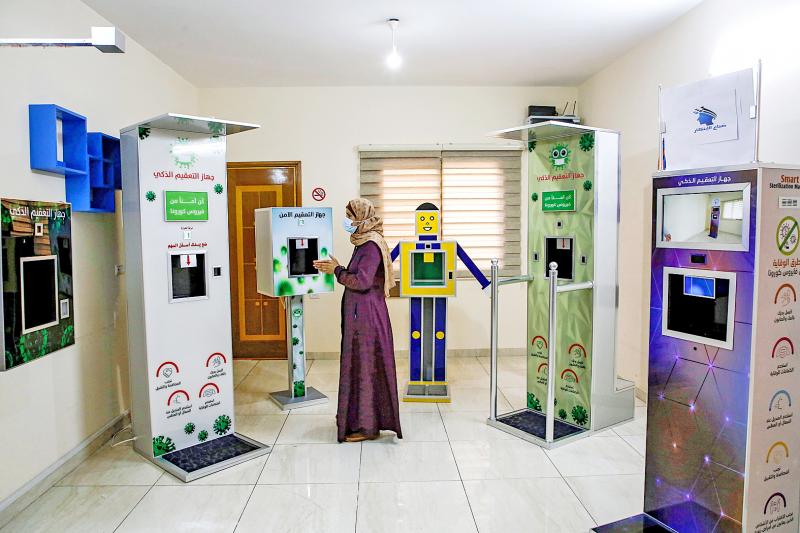Entering a Gaza City restaurant, customers are welcomed by a multitasking disinfection machine designed by a Palestinian businesswoman to curb the spread of COVID-19 in the crisis-hit enclave.
Spraying hand sanitiser while taking the person’s temperature, the 2m-high device offers an all-in-one disinfection experience.
If the body temperature is too high, a red signal would light up. Otherwise, the restaurant door opens automatically to allow the customer in.

Photo: AFP
“In Gaza, we have basic devices imported from abroad to measure temperatures, and others to disinfect, but our devices combine multiple technologies in one,” creator Heba al-Hindi said.
The densely populated Palestinian coastal enclave, under an Israeli-enforced blockade since 2007, was initially largely spared by COVID-19 when the pandemic broke out.
However, dire economic conditions, a poor healthcare system and chronic electricity shortages, partly caused by the blockade, made Gaza especially vulnerable to the virus.
Confirmed infections in the enclave have topped 5,440, with 31 deaths.
“When COVID-19 reached the Gaza Strip, I told myself I had to find a way to fight its spread,” al-Hindi said. “Then came the idea of creating a sanitizer and I designed these smart machines.”
The 37-year-old mathematics graduate heads Innovation Makers, a company that has created eight anti-COVID-19 products, including a blue-and-yellow robot-like machine to appeal to children.
She said the project makes money, but that “our focus is not on the profit.”
“We’re focusing on a Palestinian product and a Palestinian invention from within the siege in the Gaza Strip, to show this invention to the world,” she said.
Innovation Makers has sold dozens of machines to supermarkets, bakeries and restaurants, for between US$550 and US$1,500 depending on the technology used.
The products have been patented by the Ramallah-based Palestinian Ministry of National Economy in the Israeli-occupied West Bank.
The company finds spare parts for the devices on the local market, but is barred by Israel from exporting the “Made in Gaza” creations, slowing down al-Hindi’s ambitions.
Management at the Taboun restaurant is delighted with the disinfecting machines they bought.
“The device is remarkable,” said Matar Matar, hospitality manager at the Gaza eatery, adding that he found out about it on social media.
Customers are happy to see that “something new is being developed in Gaza,” he said.
Computer engineer Mohammad Natat, 23, said he was proud to be part of the team that created the machine.
“I had the opportunity to take part in this work and be creative in my field,” he said. “It was a huge chance to have some work.”
About half of Gaza’s population is out of work, two-thirds of them young people, according to the World Bank, and more than two-thirds of residents depend on humanitarian aid.

Kehinde Sanni spends his days smoothing out dents and repainting scratched bumpers in a modest autobody shop in Lagos. He has never left Nigeria, yet he speaks glowingly of Burkina Faso military leader Ibrahim Traore. “Nigeria needs someone like Ibrahim Traore of Burkina Faso. He is doing well for his country,” Sanni said. His admiration is shaped by a steady stream of viral videos, memes and social media posts — many misleading or outright false — portraying Traore as a fearless reformer who defied Western powers and reclaimed his country’s dignity. The Burkinabe strongman swept into power following a coup in September 2022

‘FRAGMENTING’: British politics have for a long time been dominated by the Labor Party and the Tories, but polls suggest that Reform now poses a significant challenge Hard-right upstarts Reform UK snatched a parliamentary seat from British Prime Minister Keir Starmer’s Labor Party yesterday in local elections that dealt a blow to the UK’s two establishment parties. Reform, led by anti-immigrant firebrand Nigel Farage, won the by-election in Runcorn and Helsby in northwest England by just six votes, as it picked up gains in other localities, including one mayoralty. The group’s strong showing continues momentum it built up at last year’s general election and appears to confirm a trend that the UK is entering an era of multi-party politics. “For the movement, for the party it’s a very, very big

ENTERTAINMENT: Rio officials have a history of organizing massive concerts on Copacabana Beach, with Madonna’s show drawing about 1.6 million fans last year Lady Gaga on Saturday night gave a free concert in front of 2 million fans who poured onto Copacabana Beach in Rio de Janeiro for the biggest show of her career. “Tonight, we’re making history... Thank you for making history with me,” Lady Gaga told a screaming crowd. The Mother Monster, as she is known, started the show at about 10:10pm local time with her 2011 song Bloody Mary. Cries of joy rose from the tightly packed fans who sang and danced shoulder-to-shoulder on the vast stretch of sand. Concert organizers said 2.1 million people attended the show. Lady Gaga

SUPPORT: The Australian prime minister promised to back Kyiv against Russia’s invasion, saying: ‘That’s my government’s position. It was yesterday. It still is’ Left-leaning Australian Prime Minister Anthony Albanese yesterday basked in his landslide election win, promising a “disciplined, orderly” government to confront cost-of-living pain and tariff turmoil. People clapped as the 62-year-old and his fiancee, Jodie Haydon, who visited his old inner Sydney haunt, Cafe Italia, surrounded by a crowd of jostling photographers and journalists. Albanese’s Labor Party is on course to win at least 83 seats in the 150-member parliament, partial results showed. Opposition leader Peter Dutton’s conservative Liberal-National coalition had just 38 seats, and other parties 12. Another 17 seats were still in doubt. “We will be a disciplined, orderly